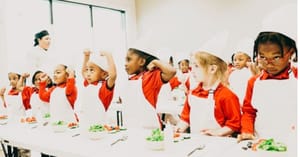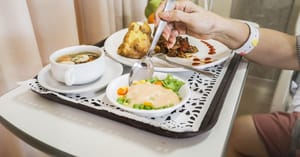Providing a wider array of choices during RamadanProviding a wider array of choices during Ramadan
The dining team at Washington University in St. Louis has been working to ensure that students have more satisfying meal options during the holy month.

With the first week of Ramadan underway, colleges and universities across the country are rolling out a variety of initiatives for students observing the holy month by fasting from sunrise to sunset.
At Washington University in St. Louis, the dining team has been crafting plans to ensure that Muslim students have access to the sorts of meals they want to eat during Ramadan—and at the times they want, too.
“Over the last few years, we’ve really been working hard to develop some really good, well-rounded options to meet the various religious dietary needs on campus,” says Associate Director of Dining Services Andrew Watling. “Part of our core mission in dining at Wash U is … that dining is going to provide a freedom of expression and help students to express themselves while on campus.”
A change in plans
With that mission in mind, Washington University Dining Services, managed by Bon Appetit, has been expanding its halal and kosher offerings, and working with different student groups to make sure their dining needs are being met.
“We’ve committed to providing halal chicken, we opened a serving station that’s halal-certified and we’ve really made a lot of steps in increasing how much we have available on campus and how easy it is to access those foods,” Watling says.
That work continued last year, when the timing of Ramadan changed so that more of the month would take place during the spring semester, rather than over summer break, Watling says. The team partnered with the school’s Muslim Student Association to develop a Ramadan initiative that would better support students during that time, but the impending pandemic had other plans.
“We were all kind of set to go with a lot of this stuff, and then COVID sent everybody home,” Watling says. However, the team “kept a hold of the ideas and what we had planned so that we could bring it up again for this year.”
Thinking outside the box
“The easiest way to do Ramadan is that you offer prepackaged items [diners] can pick up and then eat later,” Watling says. Yet much of the student feedback the team received centered around the fact that diners weren’t always sure what they would want to eat ahead of time.
Though they planned to expand hours at certain dining stations throughout the month, the dining team looked for ways that customers could retain some meal flexibility and customization while eateries were closed.
One solution they came up with? The salad robots added to campus during the pandemic, which students can access 24 hours a day. The team worked with Chowbotics, maker of the school’s salad robots, to develop some Ramadan specials, including a chicken tikka mac and cheese and a lamb gyro rice bowl.

Photo courtesy of Washington University in St. Louis
“I think it’s important when we’re putting these programs together [that] it’s not just what do we think [students] want or what do we think is going to be best, but what do the students who are going to be utilizing it really want and what are they going to eat?” Watling says.
Expanded options
During conversations with students, they also found that while some customers seek more Middle Eastern or Mediterranean dishes during Ramadan, that wasn’t always the case. Others, Watling says, are seeking American-inspired fare, including burgers and fries. The key, he says, is to offer a variety of options.
Contributing to that variety, the team will be serving up dishes developed via its new Recipes from Home initiative. Through this program, members of the Muslim Student Association submitted favorite recipes that will in turn be offered at campus eateries throughout the month.
Menuing these items also gives the team a chance to educate the student body about Ramadan and why it’s important, he says.
“I was talking to one of the student leaders from the Muslim Student Association and he said [that] before he came to school, he didn’t necessarily practice eating halal or following a lot of the dietary guidelines, and he decided that when he came to Wash U, he wanted to start actually doing that,” Watling says. “And because we had enough offerings and we had so many things available, he felt like he was actually able to do that. … I think things like that are really, for me, good to hear—that we’re not just providing the minimum that a student needs, but we’re actually giving them an opportunity to really figure out who they are and who they want to be.”
About the Author
You May Also Like




.jpg?width=300&auto=webp&quality=80&disable=upscale)

